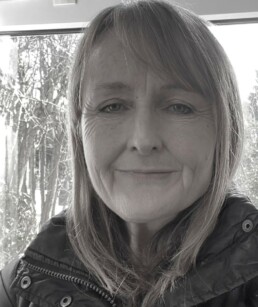Kate Sadler
Kate Sadler is a public nutritionist with over 25 years of experience in the design, management, evaluation and research of nutrition interventions in Africa and Asia. She started her career as a program nutritionist in several countries in Africa, including Ethiopia, Malawi, Sudan, Rwanda and Burundi and for the past 15 years has worked in global policy/programme technical support and applied research in the area of nutrition and food security. As part of this work she has overseen the operations of a small research organization, worked as an assistant professor at post-graduate level and has managed multisectoral teams and projects. Kate has a PhD in nutrition and was an integral part of the team responsible for the multi-country research on which the adoption of the CMAM approach (for the community-based management of acute malnutrition) was based. Examples of Kate’s recent projects include the research of community case management of severe acute malnutrition in Bangladesh; linking livestock interventions to child health and nutrition in pastoralist areas of Africa; the strengthening of nutrition across multi-sectoral programs (including HIV, health and livelihoods) in Ethiopia; evaluation of WFP’s global nutrition and HIV policy and programmes and a literature review, a technical brief and podcasts on the prevention of wasting.
Silvia Kaufmann
Dr. Silvia Kaufmann gained her PhD and Master´s degree in Nutritional Science from the Justus Liebig University of Gießen in Germany. She also holds a Bachelor degree equivalent in Pedagogy for Vocational Training and Adult Education, as well as complementary studies in Applied Informatics and Computer Science, from the same institution.
Silvia has more than 25 years experience working in the field of food and nutrition security in the humanitarian and development contexts, mainly in South East and South Asia. In particular, she has considerable long-term experience in countries such as Afghanistan, Lao PDR and Pakistan and has held senior advisory positions with the World Bank, UNICEF and FAO. Prior to that she worked with WFP and GIZ as food and nutrition advisor.
During her assignments, Silvia has supported and led the development and evaluation of food and nutrition-related sectoral and multi-sectoral policies, strategies, programmes and action plans. She worked in both multi-sectoral and multi-stakeholder environments, and had been responsible for coordinating, providing advice and developing capacities for planning, financing and implementing food and nutrition-related actions. In this regard, she has applied her expertise and knowledge across many key sectors including health, agriculture, livestock, fisheries, rural development, forestry, water and sanitation, education and social protection, among both government and partner institutions.
Dr. Kaufmann believes that robust planning and management capacities among public sector institutions are the key to enabling commitments and to end hunger and malnutrition.
Amal Tucker Brown
Amal Tucker Brown has been working in International Public Health and Nutrition for over 15 years in Africa and Central America. She worked for UNICEF for 10 years in Ethiopia, Madagascar, South Sudan, Somalia, Malawi, Uganda and for NGOs and research centres (Action Against Hunger and Concern Worldwide) in DRC, Niger, Guatemala, Honduras and Rwanda.
Amal has developed a broad range of skills and experience across humanitarian and development contexts. Her areas of expertise include country and regional level technical leadership and quality oversight, policy and strategic development, programme design and large-scale implementation. She is particularly interested in systems thinking, multisectoral coordination and public/private partnerships.
Amal works part-time as the regional coordinator for West and Central Africa for Iodine Global Network and as an independent consultant for UN agencies. She has a master’s in Public Health Nutrition from the London School of Hygiene and Tropical Medicine and a postgraduate diploma in Dietetics; she speaks English, French and Darija (Moroccan Arabic).
Peter Hailey
Peter Hailey is a humanitarian nutritionist who has lived and worked in emergencies and fragile areas of Central Europe and Africa for over 25 years. He is a nutrition specialist with extensive international experience managing large scale nutrition specific and sensitive programs. He recently completed an assignment as chief of nutrition in UNICEF Somalia where he successfully led UNICEF’s extensive scale up in nutrition and cash programming in response to the 2010/11 famine. Prior to this, he worked with UNICEF and NGOs in emergencies around Africa, the Balkans, and Central Asia. In 2014, with a colleague he started a trust, Centre for Humanitarian Change (CHC), based in Kenya working on issues related to a new way of working in the fragile areas of East Africa. His work for CHC has involved consultancies and research on adaptive learning, health system strengthening, surge approaches, localization and marginalization in Somalia, and resilience in East Africa and beyond. He is a member of the Famine Review Committee, an independent committee, supporting the Integrated Phased Classification System in countries where famine is a high risk.
Delphin Diasolua Ngudi
Delphin Diasolua Ngudi

Delphin has more than 25 years of national and international experience working in nutrition and food security programmes, as a nutritionist with the National Nutrition Institute, the UN agencies, MQSUN & MQSUN+, ESTHER, NutritionWorks, TASC and various other international nutrition partners.
Delphin’s experience covers contextual analysis, policy and strategic review and drafting, concept note development, training, protocol and guidelines development, assessment, operational and academic research, reporting, programming, and monitoring & evaluation. demonstrated ability to communicate, interact, and collaborate effectively with leaders, colleagues, and communities, both orally and in writing; Ability and willingness to work with people of diverse cultures, background and economic status.
For the past 15 years, Delphin has worked as an international consultant in more than 10 African countries providing a range of technical support to governments, NGO (national or international), donor, civil societies including: nutrition and food security landscape analysis; development of nutrition policies and strategic plans; development of guidelines, curricula and training modules; nutrition-specific programming; integration of nutrition into social protection and in national strategic plans to fight HIV and TB as well as into country proposals and concept notes; planning and implementing nutritional assessments; training and capacity-building; data analyses and consolidating recommendations; reviewing National Nutrition Strategies and development of Multi-sectoral Monitoring and Evaluation Frameworks and conducting nutrition evaluations.
As a university researcher, Delphin has significant experience in co-editing network newsletters, reviewing scientific articles for peer-reviewed international journals as well as mentoring and coaching students, publishing scientific research papers and delivering presentations.
Bradley Woodruff

Dr. Woodruff graduated from Upstate Medical Center in 1980 after which he completed two years of training in general surgery. He then worked in African mission hospitals for a year and local Pittsburgh emergency departments for two years before enrolling in the Masters in Public Health program at Johns Hopkins University. In 1986 he entered the Epidemic Intelligence Service program at the Centers for Disease Control. During his first 9 years at CDC from 1987-1996, Dr. Woodruff worked in the fields of bacterial enteric diseases and viral hepatitis, taking time from his regular job to travel to refugee emergencies when needed.
From 1996-2003, he did this work full-time as a staff member of CDC’s International Emergency and Refugee Health Branch and served as Branch Chief for part of this time. From 2003 to 2007, he moved to the International Micronutrient Malnutrition Prevention and Control group at CDC where he provided technical supervision to the staff of micronutrient specialists. Since retirement in 2007, he has served as a consultant to United Nations agencies and non-governmental organizations, providing technical assistance in large nationwide nutrition assessment surveys, program evaluations, and research studies.
Paul Rees-Thomas

Paul Rees-Thomas has been working in International Public Health Nutrition and Food Security for 18 years and has been associated to NutritionWorks since 2003. He has focused on programme design, implementation and evaluation as well as nutritional causal analysis and the scale-up of community-based management of malnutrition (CMAM). Whilst the majority of his field experience is East European and East and Central Africa, Paul has also held senior nutrition and health advisor posts at a three INGO international headquarters, including Action contre la Faim, Concern Worldwide and Merlin.
He has promoted and led technical strategic development and capacity building within those organisations as well as promoting and managing conferences and workshops for both internal and external public health practitioners. Paul is a native English speaker and can also work in French.
Laura Phelps
Laura Phelps has been working in the field of International Public Nutrition for the past 12 years. She has experience of nutrition, food security and livelihoods programme analysis, design and implementation, with related policy and advocacy, evaluation and capacity development within humanitarian NGO’s. This ranges from nutritional causal analysis to infant feeding policy development, and delivering training in integrated emergency and rehabilitation preparedness and response. Laura is particularly interested in the developing field of urban programming, social protection, and food price rises, and the links with nutrition.
She has extensive experience working in South, East and Central Asia, and has also worked in sub-Saharan Africa, Eastern Europe and the South Pacific. Laura currently works part-time as an Emergency Food Security and Livelihoods Advisor for Oxfam GB. Previous organisational affiliations include Action Against Hunger UK and USA and Save the Children UK. Laura has an MSc in Public Health, and a postgraduate diploma in Dietetics.
John Borton
John Borton has worked continuously in the international disaster and humanitarian sector since 1981. His roles have focussed on programme planning and evaluation, research, organisational and inter-organisational learning, organisational strategy, network development, and capacity building.
During his 11 years as a Research Fellow at the Overseas Development Institute he: established and was the initial co-ordinator of the Relief and Rehabilitation Network (now the Humanitarian Practice Network); led the Study III (humanitarian) team of the Joint Evaluation of Emergency Assistance to Rwanda (JEEAR); led the creation of both the Humanitarian Policy Group (HPG) and the Active Learning Network for Accountability and Performance in Humanitarian Action (ALNAP), of which he was its coordinator for the first five years. Since leaving ODI he has worked as independent consultant within the humanitarian sector undertaking a variety of research, capacity development, and evaluation and writing roles. For 9 years he was the Learning Support Advisor to the ACT/Caritas funded NCA Darfur Programme. His role for NutritionWorks has focussed on supporting DFID’s evaluation processes through the EQUALS programme.
John has a first degree in Geography (Oxford) and a Masters in Agricultural Economics (Reading). His voluntary roles have included serving as a Trustee and Council member of Oxfam GB (1998-2000) as a Trustee and Independent Board Member of the UK Disasters Emergency Committee (DEC) (1998-2002). He is currently a Trustee and Area Convenor for Herts Welcomes Syrian Families – a charity supporting 50 Syrian families being resettled in Hertfordshire.
Rita Bhatia

Rita Bhatia brings extensive experience in managing public health nutrition programmes working with Non-Governmental Organizations (NGOs), and UN agencies dedicated to protection, food security, nutrition, food fortification, education and HIV and AIDS. Her career emphasis has been on conceptualization, planning, management and evaluation of programmes. Rita believes in coaching and mentoring young public health professionals. She acts as a resource person for public health nutrition training and workshops around the world. She has been the course director for nutrition in emergency training in Asia and the resource person in the middle-east.
During her positions with the United Nations and NGOs, Rita provided leadership in public nutrition and health programme. The jobs entailed developing policies and strategies, fostering inter-agency collaboration, providing programme and technical support, undertaking training and workshops, leading food security and nutrition assessment and monitoring and evaluating programmes.
In addition Rita has extensive emergency experience. She managed major nutrition emergency operations in Sudan, Ethiopia, Kenya, Somalia, Bangladesh, Nepal, Gulf crisis, Great Lakes (Goma, Rwanda, Burundi, and Tanzania), Balkans (Bosnia, Kosovo), East Timor, Indonesia (West Timor), Pakistan, Afghanistan, Philippines and Syria.
Rita is currently a freelance consultant involved in country portfolio evaluations, capacity development, and board member of local and international NGOs and on technical advisory panel.
Rita has Master’s degrees in Nutrition from India and Social Development from University of Wales, Department of Development Studies, United Kingdom.





